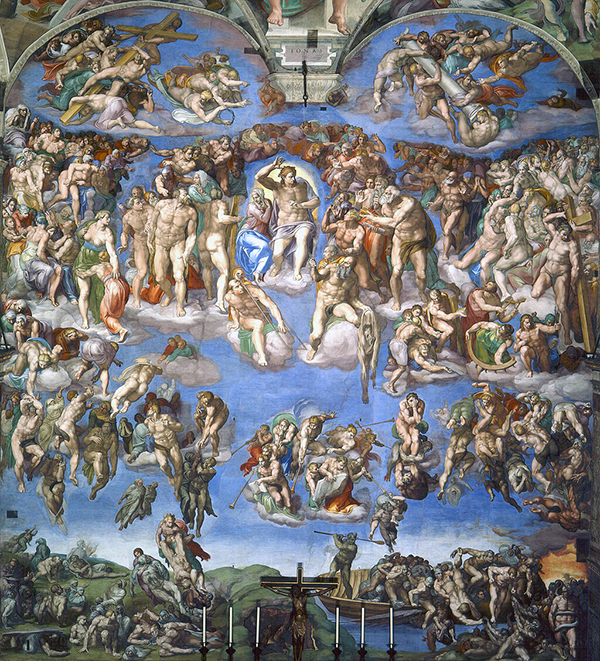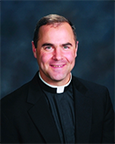Fear and Fearlessness
- FATHER PAUL SCALIA
Fear no one ... do not be afraid ... be afraid ... do not be afraid (see Mt 10:26-33). Our Lord seems to be giving contradictory commands.
 Last Judgment by Michelangelo, Public domain, via Wikimedia Commons.
Last Judgment by Michelangelo, Public domain, via Wikimedia Commons.
In these eight verses, he commands us three times not to be afraid and once to be afraid. Now, this seeming confusion is of a piece with the rest of Scripture. One of the most common lines in the Bible is Do not be afraid. And yet another common exhortation is to fear the Lord. The Psalmist, for example, makes the curious invitation, "Come, children, listen to me; I will teach you fear of the Lord." (Psalm 34:12) So, how do we make sense of this?
Fear is an inescapable reality for us because we are contingent beings. We fear because we sense that deep truth that we depend on another for our existence. Even the most rugged individualist among us didn't bring himself into being and doesn't sustain himself in being. Our existence depends on something outside of us. The possibility of our being separated from that source produces fear, either good or bad. But we will fear something.
Let's begin with the good fear. Be "afraid of the one who can destroy both soul and body in Gehenna." What Jesus means here is Fear of the Lord, of the one who alone can give life and take it away. He doesn't mean horror or fright at the Lord, as though God is simply out to punish us. He means the fear of going against and being separated from the one who holds us in being. It's the attitude of a child in the arms of his father; he dares not rebel against the one who holds him safe.
This fear is first an acknowledgment of God's transcendence and almighty power: He is God; I am not. All spiritual growth and the entire Christian life begin with this truth. Thus, "Fear of the Lord is the beginning of wisdom." (Proverbs 9:10) It is the humble acknowledgment of our nothingness that opens us to the work of God's grace. That is why Fear of the Lord is regarded as the first of the Gifts of the Holy Spirit. Without this disposition and attitude, we regard ourselves as sufficient and thus close ourselves off to his grace.
If we forget this truth—He is God; I am not—then we make Him unnecessary to us. He's nice to have around, but not absolutely necessary. He becomes just another person in our life or, worse, a talisman that we bring out when we need it. Unfortunately, we have so domesticated God that many Catholics treat Him in just that way, as someone on hand for comfort and, of course, affirmation. Fear of the Lord delivers us from such irreverence. It keeps us from using God as a means to an end.
Fear of the Lord leads to freedom, is the necessary foundation for trust, and makes us fearless.
More importantly, this fear is a reverence for God as Father. Notice how in this passage Jesus exhorts us to fear while speaking also about the Father's tender care and provision for us. Fear of the Lord is ultimately a fear of offending our Father because He loves us. It keeps us from sin not so much because of punishment (although that's not a bad motivation), but because of love. It is the fear of disrupting our relationship with Love by our sin.
Contrary to what the modern mind might think, Fear of the Lord leads to freedom. What enslaves us is fear of the wrong things: poverty, humiliation, weakness, loneliness, etc. Fear of these lesser things leads us into sin, or to control the situation and avoid the suffering. Thus, the adage that Fear is the chief activator of our faults. False fears lead us to grasp for control and drive us into the slavery of our own willfulness.
Further—and again counterintuitively—this fear of God as almighty Father is the necessary foundation for trust. After all, we don't trust what we perceive to be weak. If His power cannot be feared, then neither can it be trusted. Precisely because He is mighty enough to be feared, we can also trust in Him. Most importantly, His power and might are for us, His children.
Finally, Fear of the Lord makes us fearless—which explains Jesus' seeming contradiction in today's Gospel. Fear of the Lord puts everything else into perspective. If we are rooted in Fear of the Lord—knowing Him to be our almighty God and loving Father—then we shouldn't fear anything else. Or as Raniero Cantalamessa put it, "Fear God and don't be afraid." Persecution, humiliation, poverty, illness, even death—as long as we cling to our heavenly Father, we shouldn't fear any of these things.
This is the secret of the martyrs and why our Lord contrasts these fears in this exhortation to witness and martyrdom. The martyrs triumphed over persecution and suffering not because of their own strength but because by Fear of the Lord they clung to Him who was able to save them from death. And they were heard for their godly fear. (see Hebrews 5:7)
What do you fear? This is a timely consideration. It seems that things are unravelling before us and there seem to be many reasons for fear. But if we have that proper fear of the Lord, then we can rest secure in the Father's might, freed from any other fear.
 This is J. Fraser Field, Founder of CERC. I hope you appreciated this piece. We curate these articles especially for believers like you.
This is J. Fraser Field, Founder of CERC. I hope you appreciated this piece. We curate these articles especially for believers like you.
Please show your appreciation by making a $3 donation. CERC is entirely reader supported.

Acknowledgement
 Fr. Paul D. Scalia. "Fear and Fearlessness." The Catholic Thing (June 25, 2023).
Fr. Paul D. Scalia. "Fear and Fearlessness." The Catholic Thing (June 25, 2023).
Reprinted with permission from The Catholic Thing.
The Author
Fr. Paul Scalia is a priest of the Diocese of Arlington, VA, where he serves as Episcopal Vicar for Clergy and Pastor of Saint James in Falls Church. He is the author of That Nothing May Be Lost: Reflections on Catholic Doctrine and Devotion and the editor of Sermons in Times of Crisis: Twelve Homilies to Stir Your Soul.
Copyright © 2023 The Catholic Thing


